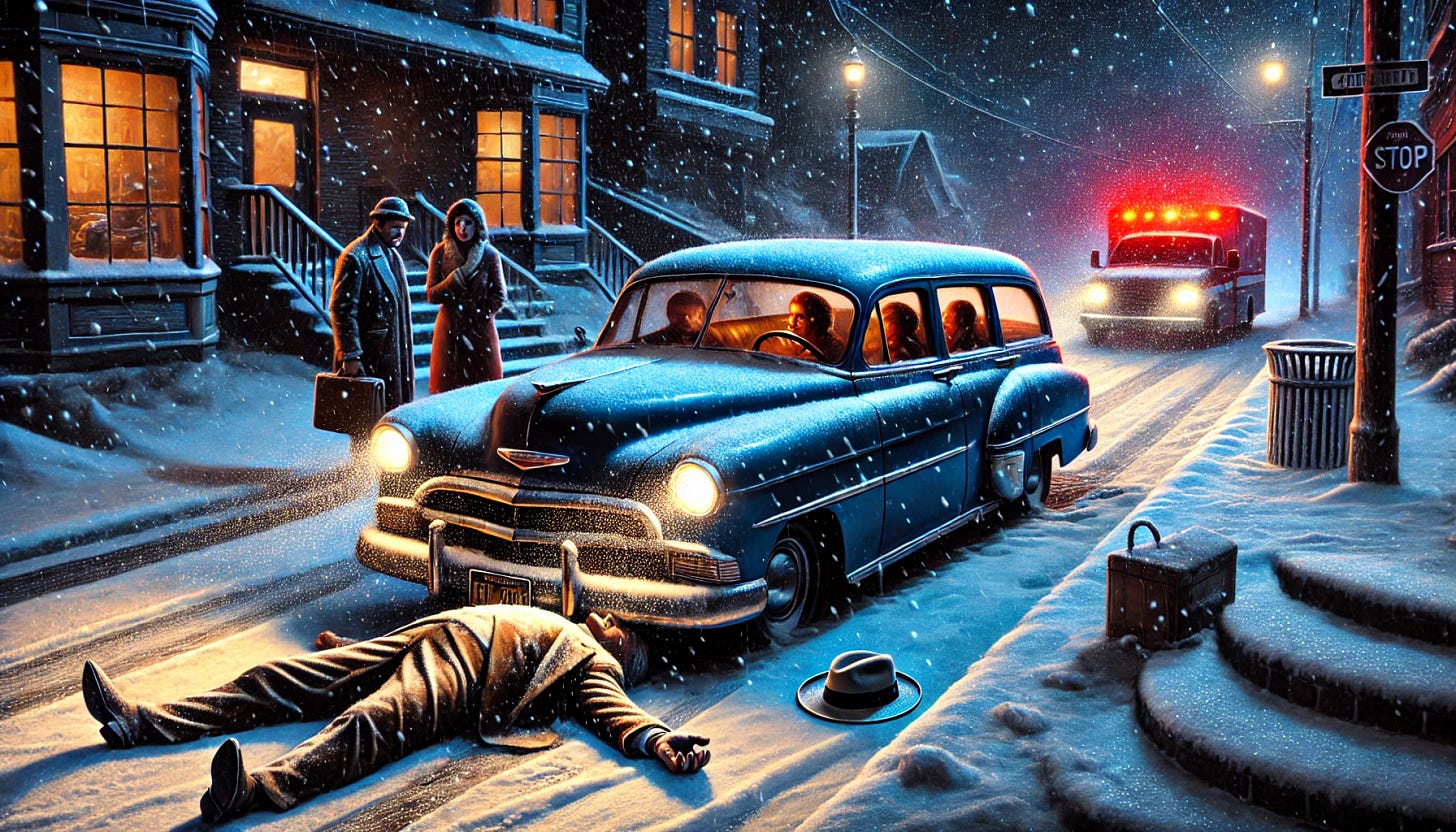Grand Street 1964, No. 3-Anonymous
I slid into the front seat
of that big blue Chevy wagon
between Mom and Dad
arguably the safest place
in my seven-year-old world
on our way to evening Mass
my unwell siblings left behind.
The wipers clapped pointlessly
against the heavy snow
engulfing the car.
Left off Jerome on to Grand,
with its 8 or 10 steep blocks
down towards Mill Street
thick snow fast blanketing the cars
lining both sides.
“Oh, careful…” Mom said.
The Chevy slowed even more.
I stared into the snow
through the snowy windshield
down the snowy hill
dim lit by snowy streetlights.
Then
between
the
cars
came the old man’s dark form
hunched against the driving snow,
stepping into the street.
Mom’s shout
Dad’s arm across my chest
the hiss of the big blue Chevy station wagon
on the frozen street.
The painfully slow seconds
the sound
that horrible sound
as he crumpled onto the hood
and then off
down to the cold snowy street
his fedora left laying lifeless
by the useless wipers.
Out of the Chevy they leapt.
I sat
frozen as the icy street
in spite of the running car
growing ever hotter
not venturing to the windshield
to see
what was unfolding
in the blinding snow
in the dark night
on the steep hill
in front of the big blue
Chevrolet station wagon.
I heard the shouting, the calling out
my parents checking on me
the sirens
saw the people coming
the police car
the ambulance
red lights sweeping the snow.
Frozen, I sat there
as the snow swirled
around the big blue Chevrolet.
Until finally, leaving,
a little boy no longer.
This heartbreaking, agonizing poem clearly and strongly depicts a troubling childhood memory, showing how quickly innocence can break. It takes us to the viewpoint of a seven-year-old, where a normal church trip on a snowy evening turns into a life-changing moment. The imagery and events reflect the confusion, fear, and paralysis that often come with trauma.
The setting is filled with snow, and the constant mention of snow heightens feelings of disorientation and loneliness. It is as if the storm took over everything. The usual comfort of the family car, the warmth of parents, and the routine Mass sharply contrast with the surprising presence of the old man. This clash of normal life and tragedy is the core of the poem.
The old man's fleeting appearance is memorable, shown in a way that highlights his vulnerability, making him seem like a victim of the harsh snowstorm. The child's stunned reaction shows how overwhelming and confusing the moment is for a young mind. The details—the sound of the tires, the crumpling body, and the lifeless fedora—are not just observations but lasting marks on the child's memory.
What makes this poem powerful is its focus on lost innocence. The narrator starts as a little boy in a very safe situation but leaves as someone forever changed. The swirling snow outside reflects the internal storm as the boy deals quietly with fear and powerlessness. The world shifts from snow-covered streets and parental safety to a place where accidents and mortality appear without warning.
In the end, this poem conveys a common experience, and that is the moment we realize the world is not as secure as we thought. The narrator cannot fully process this experience, but it becomes a key memory. The poem's strength lies in its ability to take us back to times in our own lives when we, too, left a part of our innocence behind in the face of life's unpredictability.






How many times have we escaped the mouth of the dragon?